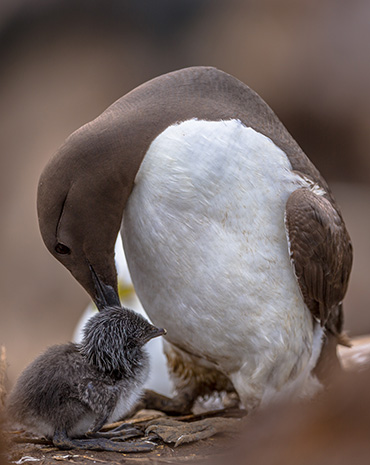
FAMILY AFFAIR Common murres take turns brooding their chick and foraging for fish. Preening each other acts as a health check and way to negotiate parental duties if one bird is in poorer condition, new research suggests.
DickDaniels/Wikimedia Commons (CC BY-SA 3.0)
Seabirds called common murres appear to use preening as a way to negotiate whose turn it is to watch their chick and who must find food. And when one parent is feeling foul, irregularities in this grooming ritual may send the other a signal that all is not well, researchers report in the July issue of The Auk: Ornithological Advances.
“The fascinating part of this study is the inference that communication between mates allows murres to negotiate the level of effort that each member of the pair puts into the breeding effort,” says John Piatt, a wildlife biologist with the U.S. Geological Survey in Anchorage, Alaska. “Reproductive success of this species requires a high degree of cooperation by each mate as they switch duties.”
Common murres (Uria aalge) lay only one egg each breeding season. Parental roles aren’t determined by gender for the birds; mothers and fathers take turns watching over their chick and foraging for fish. When one parent returns with a fish for the chick, the couple preen each other and switch roles. This swapping ceremony typically happens three to four times a day.
But study coauthor Carolyn Walsh noticed that switches don’t always go smoothly. Video of 16 pairs of murres, documenting a total of 198 role swaps, showed that sometimes both birds appeared indecisive. Each parent would hop on and off the chick several times before the birds preened each other and one left to fish. “It’s as if they’re resisting leaving the colony; neither bird actually wants to go,” says Walsh, an animal behavior researcher at Memorial University of Newfoundland in Canada.

Irregular behavior also occurred when the parent on fishing duty returned without food, which happened about 10 percent of the time. The empty-beaked bird would quickly start preening its mate, but the mate would be slow to preen back, or might not preen at all. “The brooder is basically communicating, ‘The chick still needs a fish, you better go get one,’” Walsh says.
The ceremony could be a way for the seabirds to communicate their well-being, Walsh says. By withholding preening and delaying the switching ceremony, a murre in poor condition may be trying to negotiate with its partner to have the easier job of brooding. Staying in the nest may allow the bird to rest and recover its strength.
Flying out to sea to fish is energetically costly for murres because they aren’t very aerodynamic. The seabirds are “absolutely ridiculous looking” when they fly, Walsh says. “Their wings are really meant for swimming in the water.”
In physical tests, Walsh and colleagues found a correlation between body condition and ceremony irregularities. Her team captured birds, weighed them and sampled their blood for beta-hydroxybutyrate, a metabolite associated with continual weight loss.
Switching ceremonies lasted about two minutes longer for the lightest birds, around 900 grams, compared with the heaviest birds weighing in at about 1,000 grams. Birds with lower mass and higher metabolite levels also were more likely to preen irregularly, Walsh says.
The longer ceremonies may also be a sign that there’s unrest in the nest. Murres usually mate for life, but pairs can “divorce.” A previous study by Walsh found that mates heading for a split take more time to switch roles.







